|
|
|
Sort Order |
|
|
|
Items / Page
|
|
|
|
|
|
|
| Srl | Item |
| 1 |
ID:
050580


|
|
|
|
|
| Publication |
Suite, United States Institute of Peace,
|
| Description |
vi, 57p.
|
|
|
|
|
|
|
|
|
|
|
|
Copies: C:1/I:0,R:0,Q:0
Circulation
| Accession# | Call# | Current Location | Status | Policy | Location |
| 039607 | 341.584/SMI 039607 | Main | On Shelf | General | |
|
|
|
|
| 2 |
ID:
172195
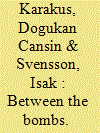

|
|
|
|
|
| Summary/Abstract |
Previous research on ceasefires in armed conflicts has primarily focused on the aggregated country-level of analysis. By contrast, this article contributes by examining the local-level dynamics of local ceasefire arrangements. In particular, this study examines a novel set of 106 local-level ceasefire arrangements in the Syrian Civil War, reached between the years 2011 to 2017. Most (72 percent), but not all, of the ceasefire arrangements were respected during the stipulated time period. We argue that informal and domestic peacemaking should outperform formal and external approaches in managing conflicts with multiple rebel groups, ongoing violence, and different fronts such as in Syria. We find that the presence of insider mediators (“insider-partial”) as well as confidence-building measures between the belligerents are positively associated with successful ceasefire arrangements, whereas explanations emphasized by previous research—external third-party mediation as well as various indicators of quality of agreement—fail to explain outcomes of ceasefires. Yet, we also find some evidence indicative of a selection effect in that external mediators are associated with more difficult conflict situations. The study of local ceasefires in the Syrian Civil War can stimulate further examinations of the micro-dynamics of peacemaking in civil wars, including the causes and consequences of local ceasefires.
|
|
|
|
|
|
|
|
|
|
|
|
|
|
|
|
| 3 |
ID:
190214
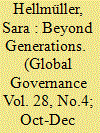

|
|
|
|
|
| Summary/Abstract |
Authors commonly categorize peace missions according to different generations: first-generation missions serving as interposition forces to monitor a cease-fire, second-generation missions with multidimensional mandates, and third-generation missions with enforcement mandates. While the generation typology is useful to show the development of peace missions over time, this article points to four main limitations: ambiguity, reductionism, linear connotations, and restricted applicability. It proposes an alternative categorization distinguishing between a minimalist approach aiming at ending violence, a moderate approach aiming at ending violence and installing some form of good governance, and a maximalist approach aiming at addressing the root causes of conflict. Based on an analysis of all UN peace missions between 1991 and 2020, the article demonstrates how this new classification overcomes the flaws of the generation typology and presents further advantages related to its focus on objectives, its versatility, and its potential for statistical analysis. It thereby allows for a more accurate analysis of UN peace missions and their effectiveness.
|
|
|
|
|
|
|
|
|
|
|
|
|
|
|
|
| 4 |
ID:
183956
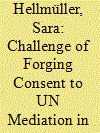

|
|
|
|
|
| Summary/Abstract |
This article analyzes how the internationalization of civil wars influences conflict parties’ consent to UN mediation processes. Illustrated by the UN mediation in Syria, I argue that internationalization influences consent directly by obstructing the advent of a costly stalemate and the parties’ perception of mediation as a ‘way out,’ and indirectly by reducing mediators’ leverage and perceived impartiality thereby limiting their tools to foster consent. The article makes three contributions. First, it presents a novel conceptual framework to understand the impact of internationalization on conflict parties’ consent. Second, it provides a long-term analysis of UN mediation in Syria from 2012–2020. Third, it contributes to a broader discussion about how civil wars end. This is of particular relevance as the prioritization of a political over a military end to civil wars, which was dominant in the early post-Cold War period, is no longer unquestioned.
|
|
|
|
|
|
|
|
|
|
|
|
|
|
|
|
| 5 |
ID:
187038
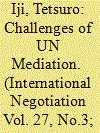

|
|
|
|
|
| Summary/Abstract |
This is the second of a two-part special issue of International Negotiation devoted to examining mediation conducted by the United Nations. The articles contribute to our understanding of the UN as an international mediator, notably its relevance and efficacy, and the challenges and opportunities it faces. Now, past its 75th anniversary, the UN can and still does mediate in the evolving international environment, showing a mixed track record of limitations and achievements in a variety of peacemaking engagements.
|
|
|
|
|
|
|
|
|
|
|
|
|
|
|
|
| 6 |
ID:
188831


|
|
|
|
|
| Summary/Abstract |
This essay discusses Ben-Meir's proposal for a confederation and examines both the disadvantages and advantages that such arrangements can offer Israeli and Palestinians and the region in general. Briefly, the confederation proposal suggests gradual agreed-upon political, economic, military, and sociocultural arrangements that will produce a new set of relationships among governments and people in these three societies. I argue that the realpolitik approach that permeates this proposal is certainly useful as an initial step toward a reduced level of violence and de-escalate conflicts. However, it falls short of building trustful relationships and moving people in the direction of healing and reconciliation. There is no doubt that the idea of a confederation as an arrangement to transform the Israeli–Palestinian conflict carries the seeds for a holistic and transformative solution to deeply divided communities and a deep-rooted conflict. However, there are several limitations to Ben-Meir's proposal that require significant additional deliberation and should lead to further modification if its core ideas are to be accepted and endorsed by both Israelis and Palestinians.
|
|
|
|
|
|
|
|
|
|
|
|
|
|
|
|
| 7 |
ID:
188832
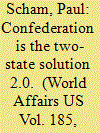

|
|
|
|
|
| Summary/Abstract |
In the wake of the failure of the “classic” two-state solution to make headway since the collapse of the Camp David negotiations in 2000, the idea of a confederal solution to the Israeli–Palestinian conflict is being increasingly seen as a realistic political format by Palestinians and Israelis of both the left and the right. Examples and models of reconciliation and confederation are discussed in this article and certain myths, including that religious strictures are unchangeable, are challenged. The author concludes that confederation is possible, though admittedly difficult, and seems the only viable alternative to the stalemated status quo.
|
|
|
|
|
|
|
|
|
|
|
|
|
|
|
|
| 8 |
ID:
072441


|
|
|
| 9 |
ID:
192318


|
|
|
|
|
| Summary/Abstract |
In the face of the current decline or spectacular collapse of peace processes, this article investigates whether peace has become systematically blocked. It investigates whether the ineffectiveness of an ‘international peace architecture’ (IPA) can be explained by a more potent counterpeace system, which is growing in its shadow. It identifies counterpeace as proto-systemic processes that connect spoilers across all scales (local, regional, national, transnational), while exploiting structural blockages to peace and unintended consequences of peace interventions. It elaborates three distinct patterns of blockages to peace in contemporary conflicts across the globe: the stalemate, limited counterpeace, and unmitigated counterpeace. Drawing on the counterrevolution literature, this research asks: Have peace interventions become the source of their own undoing? Which factors consolidate or aggravate emerging conflict patterns? Are blockages to peace systemic enough to construct a sedimentary and layered counterpeace edifice?
|
|
|
|
|
|
|
|
|
|
|
|
|
|
|
|
| 10 |
ID:
188837


|
|
|
|
|
| Summary/Abstract |
This essay offers a discussion and critique of Alon Ben-Meir's (2022) proposal entitled, “The Case for an Israeli-Palestinian-Jordanian Confederation: Why Now and How?” Incorporating elements of other viewpoints and prior proposals to add nuance, I explore Ben-Meir's concerted attempt to think past the exemplary two-state model for settling the Palestine and Israel conflict and to introduce thoughts on how policy makers and common actors can apply a confederal system later on. Given the entrenched one-state reality, I argue that the liberation of Palestinians through emancipation in a solitary popularity-based nation is the most thoughtfully clear option in contrast to many years of failed endeavors.
|
|
|
|
|
|
|
|
|
|
|
|
|
|
|
|
| 11 |
ID:
159749


|
|
|
|
|
| Summary/Abstract |
The literature on environmental peacemaking argues that cooperation in the face of shared environmental challenges can facilitate further cooperation, trust building, and eventually peace between states in conflict. Empirical research on environmental peacemaking, predominantly conducted in the form of single case studies, has so far been inconclusive. This article uses a cross-case, multimethod research design to test the environmental peacemaking proposition. More specifically, it argues that the conclusion of a cooperative environmental agreement can have a positive impact on reconciliation between rival states. Based on a new dataset on international rivalry termination, transboundary protected areas, and international freshwater agreements, this article first conducts a statistical analysis and a qualitative comparative analysis (QCA). The results are then verified and refined by six case studies. Triangulation of findings from the three studies suggests that the conclusion of a cooperative environmental agreement facilitates reconciliation in international rivalries. But this effect is contingent on a number of scope conditions, such as high environmental attention, internal political stability, wider patterns or traditions of environmental cooperation, and already ongoing processes of reconciliation. Still, the findings imply that environmental challenges do not only affect peace and security in a negative way. Addressing them jointly also opens opportunities for peacemaking and peacebuilding between states.
|
|
|
|
|
|
|
|
|
|
|
|
|
|
|
|
| 12 |
ID:
103732


|
|
|
| 13 |
ID:
067812


|
|
|
| 14 |
ID:
180887


|
|
|
|
|
| Summary/Abstract |
Completed negotiations often end in shortfalls, half glasses, and way stations. Is that enough to claim success and is a half-loaf sometimes sufficient? The nine articles in this thematic issue examine various forms of incomplete negotiations, from a full-worded agreement that is bypassed, through a formal ceasefire, an agreement among only the agreeables, a mediated but non-transforming agreement, a confidence-building agreement, and finally, claimed resolution that drives violence underground. Sufficiency has different meanings in each case, but generally refers to making some progress in handling the conflict, whereas insufficiency refers to not making progress at any level that is lasting.
|
|
|
|
|
|
|
|
|
|
|
|
|
|
|
|
| 15 |
ID:
050571


|
|
|
|
|
| Publication |
London, Royal United Services Institute for Defence Studies, 1999.
|
| Description |
vi, 88p.
|
| Series |
Whitehall paper series; no.48
|
| Standard Number |
0855161116
|
|
|
|
|
|
|
|
|
|
|
|
Copies: C:1/I:0,R:0,Q:0
Circulation
| Accession# | Call# | Current Location | Status | Policy | Location |
| 042435 | 341.584/LAU 042435 | Main | On Shelf | General | |
|
|
|
|
| 16 |
ID:
168396


|
|
|
|
|
| Summary/Abstract |
The literature on environmental peacemaking claims that groups in conflict can put aside their differences and cooperate in the face of shared environmental challenges, thereby facilitating more peaceful relations between them. This study provides the first comprehensive review of the widely dispersed empirical evidence on such environment-peace links. In order to do so, it distinguishes three understandings of peace and identifies four mechanisms connecting environmental cooperation to peace. The results suggest that environmental cooperation can facilitate the absence of violence within states as well as symbolic rapprochement within and between states, although such links are strongly dependent on the presence of several contextual factors. The most relevant mechanisms connecting environmental cooperation to peace are an increase in understanding and trust and especially the build-up of institutions. By contrast, environmental peacemaking is unlikely to have an impact on substantial integration between states or groups. Based on these findings, the article offers four suggestions for future research: (i) assess the relevance of environmental cooperation vis-à-vis other (presumably less context-dependent) drivers of peacemaking, (ii) pay more attention to the mechanisms connecting environmental cooperation to peacemaking, (iii) focus on the interactions between and the different time horizons of the three understandings of peace, and (iv) study the downside of environmental peacemaking to provide a more nuanced assessment and identify further relevant contextual factors.
|
|
|
|
|
|
|
|
|
|
|
|
|
|
|
|
| 17 |
ID:
163316
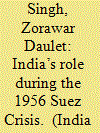

|
|
|
|
|
| Summary/Abstract |
The 1956 Suez conflict was not inevitable. The involvement of an impartial third party had offered an exit ramp for the main protagonists. Largely forgotten today, India strove to reconcile the interests of the Westerns powers with Arab nationalism. Displaying creativity and perseverance in attempting to arrest the sudden deterioration in security in its extended neighborhood, India’s unceasing but responsible support for a weaker Arab state in the backdrop of determined Western coercion is a useful illustration for contemporary policymakers who are attempting to craft a sustainable approach towards a tumultuous West Asia. Using previously unused archival documents, this paper adds to the small literature on India’s involvement in this crisis by offering the first detailed account of India’s attempt to prevent the outbreak of hostilities in those fateful months of 1956. By doing so, this article also reveals interesting facets of India’s approach to conflict management and regional stability in the 1950s, a role that was predicated on not just promoting strategic restraint between antagonistic states but also enabling conflict resolution options that preserved the vital interests of competing actors.
|
|
|
|
|
|
|
|
|
|
|
|
|
|
|
|
| 18 |
ID:
099821


|
|
|
|
|
| Publication |
2010.
|
| Summary/Abstract |
The Minds of Peace Experiment is a simulation of a potential Palestinian-Israeli public assembly. The assembly is a major public negotiating congress that invites delegations from all walks of life to discuss, debate, and negotiate solutions for the Palestinian-Israeli conflict. It is an important peacemaking tool that, together with other channels of peacemaking, can create the conditions for a peaceful resolution of the conflict. This article introduces the Minds of Peace Experiment and its practical implications. It includes theoretical background, a vision for an effective peace process and lessons from the first two rounds of the experiment which were conducted at the University of Missouri-St. Louis. The question is: How can this peacemaking effect be transformed into a mass movement that can culminate in the establishment of a major Palestinian-Israeli Public Negotiating Congress?
|
|
|
|
|
|
|
|
|
|
|
|
|
|
|
|
| 19 |
ID:
151991
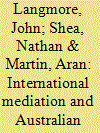

|
|
|
|
|
| Summary/Abstract |
In October 2012, Australia's parliamentary Joint Standing Committee on Foreign Affairs, Defence and Trade recommended that a mediation support unit should be created within the Australian Agency for International Development, a department now amalgamated with the Department of Foreign Affairs and Trade. The question is: Does Australia possess the motivation and capacity to implement active and effective international mediation by building the capacity of intermediaries to deploy various peacemaking methods to hasten de-escalation at different stages of a conflict? If not, is a mediation support unit an appropriate initiative to address this capability gap? This article draws on quantitative conflict data sets and an expert panel to conclude that Australia's track record demonstrates significant capacity to undertake international mediation, but that the mediation personnel and processes available to government are insufficiently resourced and coordinated to readily provide policymakers with accessible tools to undertake the diverse range of mediation strategies advocated by conflict scholars. While a mediation support unit would address some of these issues, at present it conflicts with the Department of Foreign Affairs and Trade's institutional philosophy based on diffused expertise.
|
|
|
|
|
|
|
|
|
|
|
|
|
|
|
|
| 20 |
ID:
193116


|
|
|
|
|
| Summary/Abstract |
This article introduces the Civil Conflict CeaseFire (CF) dataset. The CF data covers all ceasefires in civil conflict between 1989 and 2020, including multilateral, bilateral and unilateral arrangements, ranging from verbal arrangements to detailed written agreements. In total, the CF data includes 2202 ceasefires across 66 countries and 109 civil conflicts. The data feature information on the actors involved in the ceasefire, and the class, purpose, coverage, and end date of the ceasefire. The CF data provide an empirical basis to assess the conditions that give rise to ceasefires, how ceasefires affect the dynamics of conflict, and the role of a ceasefire in the peace process. This article presents the rationale underlying the data collection, the coding rules and procedures, and how this data can be used for analysis.
|
|
|
|
|
|
|
|
|
|
|
|
|
|
|
|
|
|
|
|
|